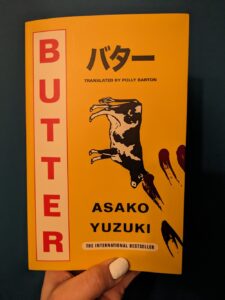Butter by Asako Yuzuki
Written by Ashley Kelmore, Posted in Reviews
Best for:
People looking for a very long book to sink their teeth into; people who enjoy romantic descriptions of meals.
In a nutshell:
Journalist Rika is after an interview with Manako Kajii, who is about to undergo a retrial after being convicted of murder three former boyfriends. When she finally gets a meeting with Manako, her life takes a turn.
Worth quoting:
“A far more important question, she had come to understand, was how to enjoy this time to the fullest.”
(talking about someone being concerned that someone else had put on weight: “Being that upset about what happens to somebody else’s body! How can someone be so conscious of what shape another person takes, of the extent to which they’ve liberated their desires? It’s not normal to feel such anxiety about that. If you’re paying more attention to the form other people are assuming than what’s taking place inside yourself, it means something is seriously wrong with you.”
“It’s like we’re all being controlled, so that when you come across a person who’s shaken off that control you feel irritated.”
Why I chose it:
It looks so interesting, and I usually shy away from longer novels and so wanted to try this one out.
Review:
I am ambivalent about this book because I think it sets out to accomplish a lot of things and ends up watering down nearly all of them. The book deals with so many themes – the celebration and worship of high-profile criminals, patriarchy in Japan, work/life balance, romantic desires and their shaping by society, friendships, food culture. Yes, books can have many interlacing and related storylines, but this book felt a bit like a slog to get through, and I’m still not entirely sure how much of what was included was necessary. Is it a book exploring the Japanese desire for women to be extremely thin? Is it a thriller trying to determine if the convicted criminal did indeed commit the crime? Is it about a woman determining what she wants for her own life? I think yes, and I think it’s maybe a bit too much in one place.
I can’t speak to how much is accurate about Japanese culture, in terms of that particular flavor of patriarchy, but there were certain themes that did resonate with me. The idea that women need to be thin to be desirable is one that translates over to US and UK cultures, and reminded me of a discussion going on right now about semi-glutides (Ozempic et al). Lots of folks seem to be judgmental about the use of them to lose weight (similar to critics of bariatric surgery’s) primarily because they see it as ‘cheating.’ Because it isn’t actually about women being thin; it’s about women being obedient. Not eating ‘too much,’ exercising the ‘right’ way, eating the ‘right’ foods. If they get thin just by taking a shot every month, they aren’t conforming in the right way.
The obsession with the convicted woman that kicks off the plot of the book is another one that feels relateable – true crime is such a huge market for podcasts and documentaries and films these days. There are people who look at criminals and see someone irredeemable, someone who isn’t complex, someone evil. There are others who are interested in how the person got to the point of committing those crimes because they find it fascinating. And there are those who either believe in the innocence of the person, or believe they aren’t responsible for their actions. Rika – the journalist from whose perspective the story is told – is a journalist interested in the back story of this woman partially because she seems so uninterested in fitting society’s expectations of women. At least … initially.
There was a lot I found interesting about this book, and my assumption is that the author would say it was all necessary to the story she was trying to tell, but there were parts that felt a bit … too much. I’m not going to get into spoilers here, but there were a lot of stories that even though they were explored, I felt like we only scratched the surface on them. Maybe that was the point? Maybe that’s a sign of quality writing – that the author got me to care about the different stories even without more information. But also I found myself annoyed, especially at the ending. There is complexity here, and there isn’t necessarily an obvious conclusion (at least to me) of the primary storyline involving the convicted murdered, so perhaps that’s partly why I’m kind of meh on things?
As I say, I am truly ambivalent about this book. It might be a fantastic piece of literature, or it might not be.
What’s next for this book:
Probably donate it.

